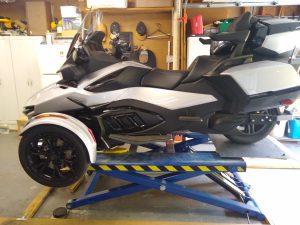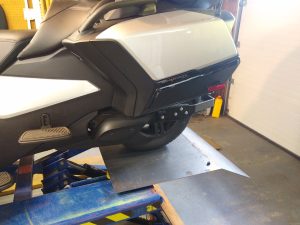Adapting Automobile Scissors Lift for Can-Am Three Wheeler
I have been riding motorcycles since 1971. My first bike was a ’66 Honda 305 Super Hawk that had been sitting for a very long time on the front porch of a Duplex in Pompano Beach, Florida. The guy that owned it was moving and had to sell it fast, so I got it cheap. Having not been run for quite a while, I had to find a way to get it home to Hollywood. (about 20 miles) I got a friend to drop me off at the Duplex with some tools and a gallon fuel can. After a few hours I got it running rode it home. It was very rough. I fixed up the mechanical problems and rode it around for a week or so then took it completely apart and repainted the bike. When it was done it looked like new and ran great too.
Well, that was typically how it was with me, fix bikes up and ride them. As I got older I found that squatting down beside a motorcycle to work on it was getting harder on my old body. So, when I finally laid out the bucks for a motorcycle lift my old back was very thankful. Now, I have a new issue, I have a three wheel Can-Am and that doesn’t fit on my motorcycle lift. I added some lights to the Can-Am which required some sitting and laying in the floor which greatly angered my back. Getting down in the floor is not a real problem, getting back up is!
Well, getting out of the two wheel motorcycle world I decided to sell the motorcycle lift. Now, what to do with the Can-Am. You can purchase a wide deck motorcycle lift for three and four wheelers, but I already had a automobile scissors lift, why not use that? My first attempts at getting the Can-Am on my Bendpak lift were iffy at best. I got it up there but the lifting points were too close together and it was not very stable. The lift was not designed to handle that centered rear wheel.
After playing around with the Can-Am on the lift and giving it some thought, I figured out that what I needed was a flat platform for the rear wheel. The lifting arms are plenty strong enough to support it, all I needed to do was fabricate the platform. I would also need a ramp to allow the rear wheel of the Can-Am to roll up on the scissors lift. I did some measuring and purchased a 36″ X 36″ piece of 3/16 steel plate. The lifting arms have to bolts in the ends that act as stops for the lifting pads. I turned the arms on the rear of the lift backwards, and drilled two holes in the plate and used the stop bolts to secure the plate to the rear arms of the lift. That would keep the platform from moving around.
I needed the ramp, so I needed to bend the 3/16 plate down just behind the lifting arms. My little press brake couldn’t handle 36″ wide material so I used a cutoff wheel on a 4 1/2 inch grinder to cut a groove in the plate. With a good groove in the plate I was able to bend the ramp section down to the floor. Once I had the bend, I laid down a bead of weld in the grove to provide strength and keep the ramp from bending more.

Platform with groove welded. The plate is attached to lift arms with the stop bolt on each side. The clamps on the front were there to hold the plate while bending down the ramp section.

The Can-Am on the lift. The rear wheel rolls up easily on the the platform. I adjusted the front lifting arms to pick up on the front edge of the frame that is just in front and inboard of the rider floorboards. You could also move the arms out and lift at ball joint on the lower control arm of the front suspension.

The rear wheel rolls up the ramp and is well supported on the platform over the lifting arms. The stop bolts keep the platform from moving.
This has worked out very well for lifting the Can-Am up to where an old guy and work on it without creating more back problems! What do you think of this idea? Let me know by leaving a comment below.
Thanks
DE N4RFC

